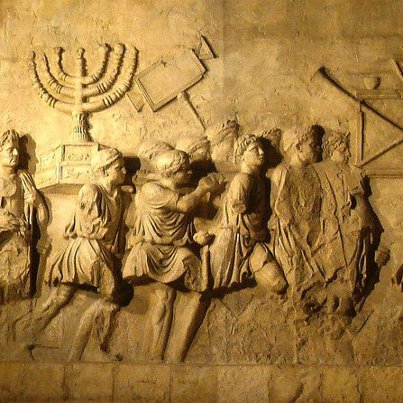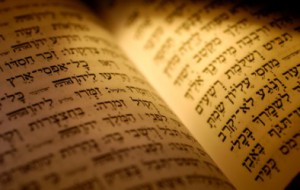On Sunday I fasted because it was the Ninth of the Jewish month of Av, and suddenly I remembered that the first Temple inJerusalem was destroyed on that day, some 2500 years ago. And again 1900 years ago. On the same day, in our tradition.
I live a thoroughly modern life.I’m an Internet junkie, and if I can’t access my email for a whole day I feel profoundly handicapped. I go to Zumba, I text my children, I order my flight tickets on-line. I eat healthy, modern (but kosher) food, I wear normal western clothes. I love kitchen gadgets, clever little tools that can only do one highly specialized job and take up more room in the cutlery-drawer than they deserve.
And also, I fast on Jewish fastdays (actually, not on all of them, but some of my kids do). On the Ninth of the month of Av I sit on the floor of the prayer-hall with my congregation and listen to the words ascribed to the prophet Jeremiah, from the Book of Lamentations, describing the chaos and desolation that ruled Jerusalem after the first temple was destroyed, in the year 586 B.C. The text is so sad, so graphic, that despite the hundreds of generations that have passed, you feel how hopeless, how devastated and lost the author is, describing not only the physical ruins of his city, but the ruins of the spiritual foundations of a whole society.
|
ט בְּנַפְשֵׁנוּ נָבִיא לַחְמֵנוּ, מִפְּנֵי חֶרֶב הַמִּדְבָּר. |
9 We get our bread with the peril of our lives because of the sword of the wilderness. |
|
י עוֹרֵנוּ כְּתַנּוּר נִכְמָרוּ, מִפְּנֵי זַלְעֲפוֹת רָעָב. |
10 Our skin is hot like an oven because of the burning heat of famine. |
|
יא נָשִׁים בְּצִיּוֹן עִנּוּ, בְּתֻלֹת בְּעָרֵי יְהוּדָה. |
11 They have ravished the women in Zion, the maidens in the cities of Judah. |
|
יב שָׂרִים בְּיָדָם נִתְלוּ, פְּנֵי זְקֵנִים לֹא נֶהְדָּרוּ. |
12 Princes are hanged up by their hand; the faces of elders are not honoured. |
|
יג בַּחוּרִים טְחוֹן נָשָׂאוּ, וּנְעָרִים בָּעֵץ כָּשָׁלוּ. |
13 The young men have borne the mill, and the children have stumbled under the wood. |
|
יד זְקֵנִים מִשַּׁעַר שָׁבָתוּ, בַּחוּרִים מִנְּגִינָתָם. |
14 The elders have ceased from the gate, the young men from their music. |
|
טו שָׁבַת מְשׂוֹשׂ לִבֵּנוּ, נֶהְפַּךְ לְאֵבֶל מְחֹלֵנוּ. |
15 The joy of our heart is ceased; our dance is turned into mourning. |
|
טז נָפְלָה עֲטֶרֶת רֹאשֵׁנוּ, אוֹי-נָא לָנוּ כִּי חָטָאנוּ. |
16 The crown is fallen from our head; woe unto us! for we have sinned. |
|
יז עַל-זֶה, הָיָה דָוֶה לִבֵּנוּ–עַל-אֵלֶּה, חָשְׁכוּ עֵינֵינוּ. |
17 For this our heart is faint, for these things our eyes are dim; |
|
יח עַל הַר-צִיּוֹן שֶׁשָּׁמֵם, שׁוּעָלִים הִלְּכוּ-בוֹ. {פ} |
18 For the mountain of Zion, which is desolate, the foxes walk upon it. |
(From Mechon Mamre, JTS)
Part of the text describes what happened, the invasion by un-named foreign forces, the desctruction and exile of the Jews from the land. But mostly the text talks about the why. The short-comings of the believers; their lack of morality, lack of loyalty towards each other, how their corruption and callousness undermined the foundations of society, and turned it into easy prey for the mighty conqueror. According to Jewish tradition, we fast to remember what happened, but more importantly, why it happened. The sages say that Jerusalem was lost because of baseless hatred. It’s not the historical event that is the main issue, but the moral decline that led to the destruction of the temple. We fast in acknowledgement of where a lack of morality can lead us.
Hopefully, as human beings, we try to do our best. Not everything is up to us, but a lot of it is. So far, I haven’t watched any of the Olympic games. I’m more of a kitchen-gadget kind of person, and besides, all the kids are busy with their summer-plans, and I don’t know how to make the TV work on my own. I don’t remember the Temple in Jerusalem, but I can recall when the TV had one remote-control, with which one could turn the device on and off, change channels and regulate the volume. Those were the days. Now, I take one look at the four remote-controls available, and remember why I have not watched any TV in the last few years. Anyways, those Olympic athlete gods are certainly doing their best, sometimes achieving resluts that no human being has achieved before. When it comes to human behaviour, on the other hand, I’m not sure man-kind has made any great improvements. Fasting may not make us better, but it is a kind of statement that we acknowledge our faults, and strive to do better.
Moslems around the world are now in the middle of the month of Ramadan. For an entire month, Moslems fast from sun-up till sun-down, very much with the same kind of thought, to clear time on your calendar for introspection and self-improvement, rather than planning and executing lunch and dinner.
So here are two positive thoughts that derive from our fasts. Last Friday, the first day of Ramadan, the main Israeli radio-station dedicated some hours to programs about Ramadan in Hebrew, for a Jewish audience. It takes a bit of maturity to be able to listen to “the other”, certainly in our complicated corner of the world. Maybe, we just made a small improvement.
After the fast on Sunday, there was a common break-fast meal for Jews and Moslems in the settlement of Tekoa, on the West-Bank. Religious Jews and religious Moslems, meeting and eating, and in the West-Bank, of all places. How many stereotypes can you break, in one break-fast? That must be a new record.
Let’s see some more of that kind of record, and fast!
Noomi Stahl



